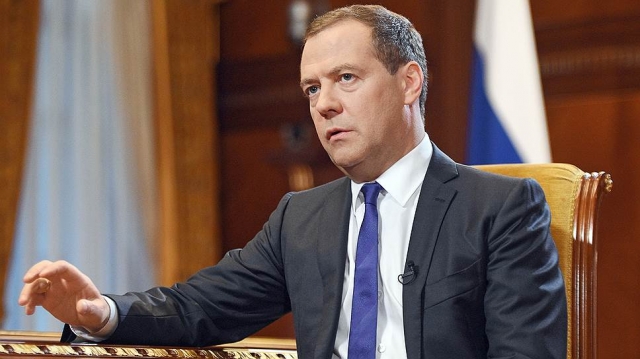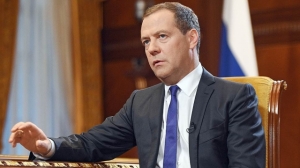Medvedev Threatens “Terrible Conflict” if Georgia Joins NATO
In an interview yesterday with Russian media outlet Kommersant, Russian Prime Minister Dmitry Medvedev, who was President during the 2008 Russia-Georgia War, discussed why Russian tanks did not enter the Georgian capital, what Moscow gained by recognizing the claims of independence of Abkhazia and South Ossetia, and about what could provoke a new conflict in the region.
Medvedev warned that if Georgia succeeds in its goal of joining the NATO alliance, it could lead to serious conflict between Russia and the West. NATO leaders stated that Georgia will join the alliance in the future at the 2008 Bucharest Summit, which was followed by the 2008 Russia-Georgia War, which ended with Russian forces occupying a significant portion of Georgian territory in Abkhazia and the Tskhinvali region.
In his interview, Medvedev said the 2008 war “was not inevitable.” He blamed the conflict on “the irresponsible, immoral, criminal conduct of Saakashvili and his minions...and given the fact that the head of Georgia at that time was such an unbalanced person in a psychological sense, as Mikhail Saakashvili was, there simply was not any other option [but to recognize Abkhazia and South Ossetia as independent]. Perhaps, if there was another leadership, it was possible to discuss something. But I am sure that different leadership simply would not have adopted such an ugly decision to attack the elderly and children, to attack Russian peacekeepers and, in fact, to declare war on the Russian Federation.”
When asked why troops did not enter Tbilisi, Medvedev disputed Saakashvili assertions that the goal of the war was to provoke the collapse of the Georgian government, saying “the goal was to get the Georgian troops out of Tskhinvali, to put things in order, and to prevent the further escalation of violence...The goal was not to crush Georgia or execute Saakashvili. I believe that I did the right thing when I decided to show restraint and not to force further actions.”
Regarding what Russia gained from the war, Medvedev said, “Russia got the main thing - peace. We were able to protect our citizens - they are many, citizens of the Russian Federation, who live in Abkhazia and South Ossetia. And we do not always have a headache that at some point there will be another attack...As a result, everything in the region is clear.”
Speaking on issues of NATO, Medvedev said, “NATO enlargement is an absolute threat to the Russian Federation. And this is an unconditional challenge.” He responded to NATO’s recent reiteration that Georgia will join the alliance – “This is an absolutely irresponsible attitude. It's just a threat to the world. We all understand that there is a certain tension in the territory of Georgia, that Georgia is considering neighboring territories, or, from our point of view, states, as its own. Hence, there is an unsettled territorial conflict, regardless of the position we are in. And such a country, such a state will be admitted to the military bloc? Do we understand what this threatens? This can provoke a terrible conflict. It is unclear why this is necessary. If it's just a diplomatic trick, like “we'll take you, do not worry,” but in fact, we will not do anything – this is another story. Let then our colleagues from the North Atlantic alliance look at each other, they will think up something else clever.” Georgia joining the alliance “can lead to a potential conflict, beyond any doubt...therefore, I hope that the NATO leadership will still have the cleverness to do nothing in this direction,” said Medvedev.
The Russian Prime Minister is, however, optimistic about the future of relations with Georgia despite the ongoing territorial occupation, saying “I think that this too is not a problem that forever predetermined the nature of relations between Russia and Georgia.” Medvedev stressed the possibility of renewing relations with the post-United National Movement government, “the career of Saakashvili...is finished in Georgia, which, I think, is very good for Georgia itself. And with the new leadership (whatever their surnames, what their party affiliation is), we are ready to build relations. Diplomatic relations can be restored, we did not destroy them. If Georgian colleagues are ready to restore them, we, naturally, will not object.” He continued, “In recent years, there has been a significant increase in trade and economic cooperation, tourist communication, planes are flying, people come to Georgia to rest. In general, all this, of course, is a plus. Ultimately, I hope this will contribute to the normalization of political contacts and the resumption of a full-fledged dialogue between Moscow and Tbilisi.”
The full interview (in Russian) is available here.
By Samantha Guthrie
Photo: Alexander Miridonov / Kommersant












